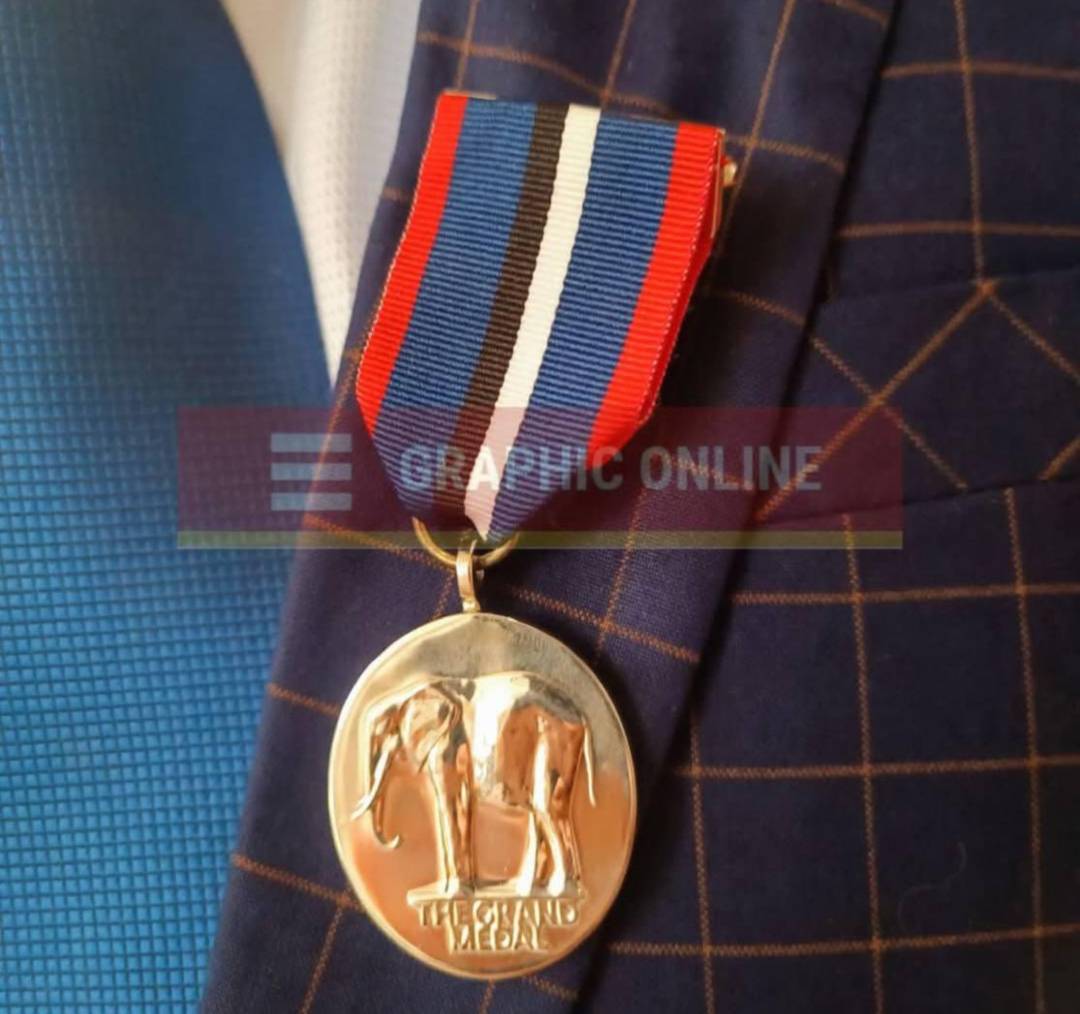When Vice President Mahamudu Bawumia was awarded the prestigious *Order of the Star of Ghana* by President Nana Addo Dankwa Akufo-Addo, many people were surprised by the medal's design. The *Order of the Star of Ghana* is the highest national honor given to those who have made significant contributions to the country. It is supposed to symbolize national unity, patriotism, and the hard work of individuals who have helped to improve the nation. However, this time, there was something about the medal that caught the attention of many Ghanaians for all the wrong reasons.
Instead of the usual national symbols like the Coat of Arms of Ghana, the medal had the elephant on it. For those who are familiar with Ghanaian politics, this symbol is strongly associated with the New Patriotic Party (NPP), the political party that both Nana Akufo-Addo and Bawumia belong to. The elephant is the official symbol of the NPP, and it has been a part of their identity for many years. The use of this symbol on a national award sparked a heated debate across the country.
For many Ghanaians, the appearance of the elephant on the medal seemed to make the award more about political party loyalty than national pride. Some people felt that the government was trying to make the award look like a reward for party loyalty rather than an honor for the vice president’s contributions to the country. Critics argued that a national award, especially one as important as the *Order of the Star of Ghana*, should not carry political symbols that are linked to a specific party. Instead, it should reflect the unity of the entire country, no matter who is in power.
The colors on the medal added fuel to the fire. The bright yellow, green, and blue colors of the medal are also the colors of the NPP. This raised even more questions about whether the government was using national awards to promote party interests. The colors, combined with the elephant symbol, made it seem as though the award was less about serving Ghana as a whole and more about rewarding a specific political group. This left many wondering whether the medal was meant to celebrate Bawumia’s achievements or to send a message of political favoritism.
The controversy surrounding this award reflects the deep political divisions in Ghana. The country has a strong tradition of democracy, but like many nations, it is not immune to partisan politics. Over the years, Ghana has seen political tensions rise between the two major parties: the New Patriotic Party (NPP) and the National Democratic Congress (NDC). The rivalry between these two parties has sometimes led to clashes, with each side accusing the other of unfair practices and political manipulation. The medal incident only seemed to add to these tensions, as it was seen by many as a sign that the government was putting the interests of the NPP above those of the nation.
President Akufo-Addo’s decision to award Bawumia the *Order of the Star of Ghana* with the NPP’s elephant symbol has been viewed by some as a way of cementing party loyalty. By awarding the medal in such a way, the president may have been sending a message to his supporters that Bawumia was a loyal member of the party, deserving of such a high honor. This is a common practice in many countries, where politicians reward loyal members of their party with prestigious titles or awards. However, it has also raised questions about whether the government is focusing too much on party politics instead of promoting national unity.
For those who support the NPP, the award might seem like a well-deserved recognition of Bawumia’s hard work and contributions to the country. Bawumia has been a key figure in the Akufo-Addo administration, particularly in the areas of finance and economic policy. His role in promoting digitalization and financial inclusion in Ghana has been widely praised. Supporters argue that the award is a reflection of his commitment to the nation and that the use of the elephant symbol and party colors is a minor issue compared to his accomplishments.
On the other hand, critics of the government argue that this move undermines the integrity of national awards. They believe that national honors should be given based on merit and not on political affiliation. To them, the elephant symbol and NPP colors on the medal are a reminder of how politics can sometimes overshadow the national interest. They argue that the use of these symbols makes it difficult to see the award as a genuine recognition of Bawumia’s work for the country, rather than as a political gesture.
This situation also raises broader questions about the role of national symbols and awards in a democracy. In an ideal world, national honors would be given without regard to political affiliation. They would be awarded to those who have made the greatest contributions to the country, regardless of which party they belong to. However, in a politically charged environment like Ghana, it can be difficult to separate politics from national symbols, especially when the ruling party has a strong influence over the state’s institutions.
In conclusion, the controversy surrounding the *Order of the Star of Ghana* awarded to Vice President Bawumia is just one example of how deeply political issues can impact even the most symbolic acts of recognition. The elephant symbol and NPP colors on the medal have sparked a debate about the use of national awards for political purposes. While some see it as a well-deserved recognition of Bawumia’s work, others view it as a sign of partisanship. The incident highlights the challenges of maintaining unity and impartiality in a politically divided nation like Ghana.




No comments yet
Be the first to share your thoughts!